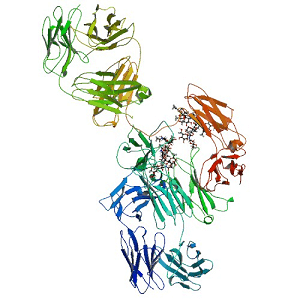
In vitro: Cetuximab is a recombinant chimeric monoclonal antibody that binds to the human epidermal growth factor receptor (EGFR) with high affinity. Binding to EGFR blocks phosphorylation and activation of receptor-associated kinases which results in cell growth inhibition, induction of apoptosis, and decreased vascular endothelial growth factor production. C225 showed a significant single agent antitumor effect and an additive effect with cisplatin or paclitaxel in NPC cell lines with high EGFR protein expression (HK-1 and HONE-1) but a minimal activity in NPC cell lines with a low expression (CNE-2 and C666-1). Cetuximab blocks epidermal growth factor receptor (EGFR)-ligand interaction and inhibits downstream RAS-ERK activation. Cetuximab fostered an ER stress response and the translocation of ER proteins to the cell membrane. Cetuximab promotes phagocytosis by dendritic cells. Cetuximab is effective in K-ras wild-type, EGFR-expressing gastric cancer cell lines and xenografts. It binds to the extracellular domain of EGFR with high affinity. It competitively blocks ligand binding and inhibits tyrosine kinase activation, resulting in receptor downregulation. Apart from this competitive inhibition, cetuximab binding with EGFR might trigger internalization and destruction of the receptor.
In vivo: Cetuximab enhanced the antitumor activity of several chemotherapeutic drugs in mouse xenograft models. Cetuximab, exerts its antitumor efficacy by multiple mechanisms that include the inhibition of cell cycle progression by arrest in the G1- phase and decreased cell number in the S-phase. Cell cycle arrest in the G1-phase also induces apoptosis by the induction and activation of proapoptotic molecules. cetuximab alone and in synergy with carboplatin resulted in decreases of tumor size, metastatic spread, and MVD in NCI-N87 tumors with EGFR cell surface expression and absence of mutations in BRAF and K-ras, whereas cetuximab had minimal in vitro effect and no in vivo treatment efficacy in tumors derived from MKN-45, in which the phenotype was also BRAF and K-ras wildtype, but which had only weak cytoplasmic EGFR protein expression.
| Cell Experiment | |
|---|---|
| Cell lines | NPC cell lines, HNE1 and CNE2 |
| Preparation method | Cells were cultured at a density of 5 × 10^3 cells per well in flat bottomed 96-well plates. After 24 h of incubation at 37°C in 5% CO2, 200 μL of cetuximab (62.5, 125, 250, 500, 1000, or 2000 µg/mL) and/or cisplatin (0.25, 0.5, 1, 2, 4, or 8 µg/mL) diluted with the medium to various concentrations were added to each well. After being incubated for 48 h, 10 μL of CCK-8 was added to each well. After 2 h, cell viability was quantified via reading the absorbance at 450 nm. The percentage growth inhibition was calculated as (ODcontrol − ODdrug)/ODcontrol × 100. The half maximal inhibitory concentration (IC50) values were calculated. |
| Concentrations | 62.5, 125, 250, 500, 1000, or 2000 µg/Ml |
| Incubation time | 48 h |
| Animal Experiment | |
|---|---|
| Animal models | Nude mouse model for human gastric cancer (CD-1/nu-nu mice) |
| Formulation | 0.9% saline |
| Dosages | 1 mg/kg |
| Administration | i.p. |
| Molecular Weight | 145779.44 |
| Formula | C6484H10042N1732O2023S36 |
| CAS Number | 205923-56-4 |
| Storage | -80°C for long term |
| Species | Mouse | Rat | Rabbit | Guinea pig | Hamster | Dog |
| Weight (kg) | 0.02 | 0.15 | 1.8 | 0.4 | 0.08 | 10 |
| Body Surface Area (m2) | 0.007 | 0.025 | 0.15 | 0.05 | 0.02 | 0.5 |
| Km factor | 3 | 6 | 12 | 8 | 5 | 20 |
| Animal A (mg/kg) = Animal B (mg/kg) multiplied by | Animal B Km |
| Animal A Km |
For example, to modify the dose of Compound A used for a mouse (20 mg/kg) to a dose based on the BSA for a rat, multiply 20 mg/kg by the Km factor for a mouse and then divide by the Km factor for a rat. This calculation results in a rat equivalent dose for Compound A of 10 mg/kg.
| Related EGFR/HER2 Products |
|---|
| BBT-207
BBT-207 is a reversible, mutant-specific EGFR inhibitor with antitumor activity. |
| VRN-11
VRN-11 is an EGFR C797S inhibitor. |
| TRX-221
TRX-221 is an EGFR C797S inhibitor. |
| TAS-3351
TAS-3351 is an EGFR C797S inhibitor. |
| Larotinib mesylate hydrate
Larotinib mesylate hydrate is a potent, broad-spectrum, orally active tyrosine kinase inhibitor (TKI) that primarily targets EGFR with an IC50 of 0.6 nM. |


Products are for research use only. Not for human use. We do not sell to patients.
© Copyright 2010-2023 AbMole BioScience. All Rights Reserved.
